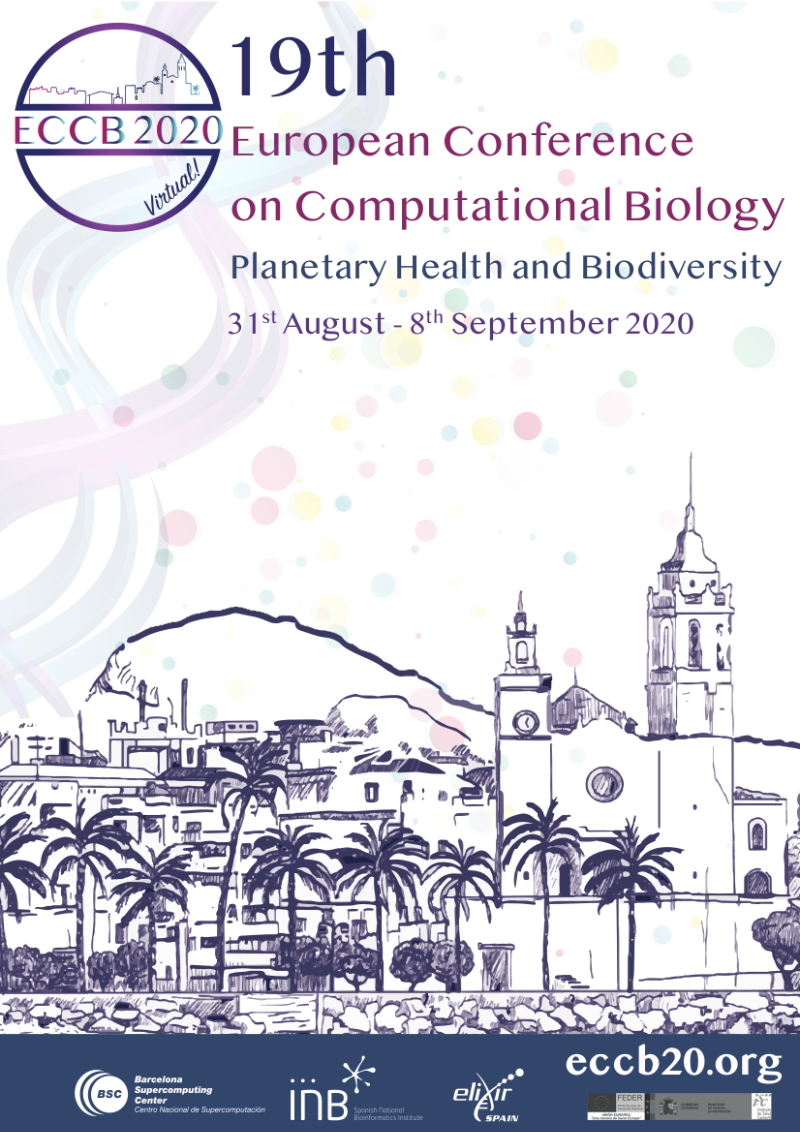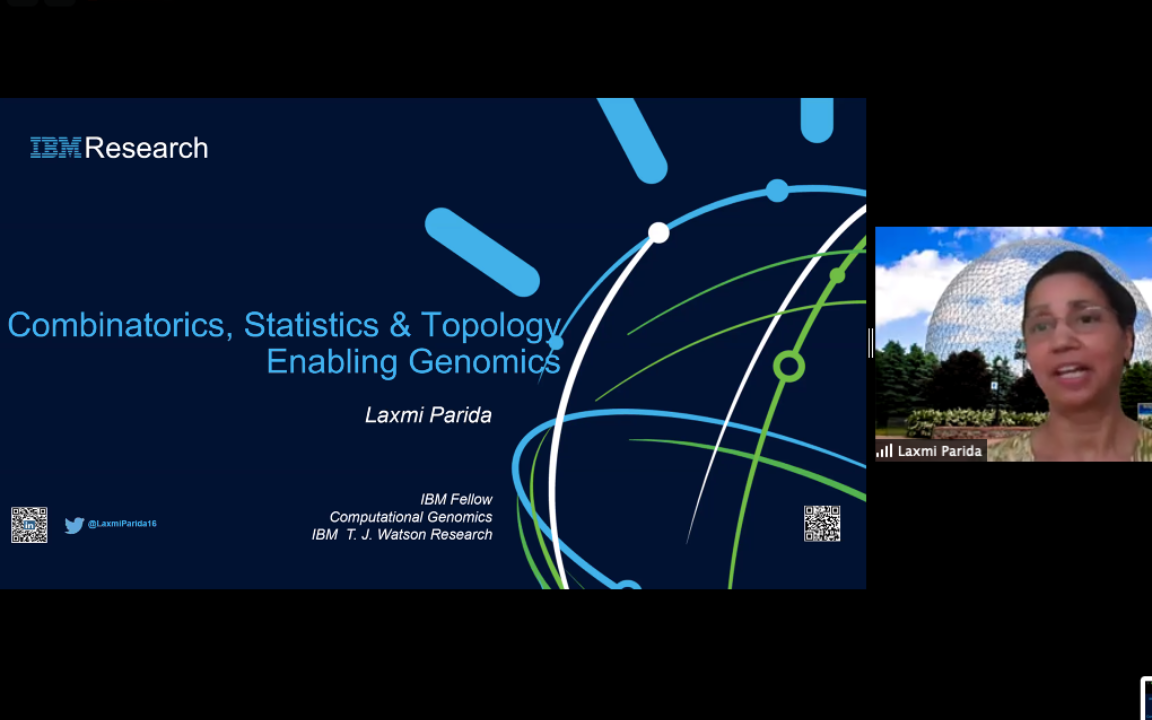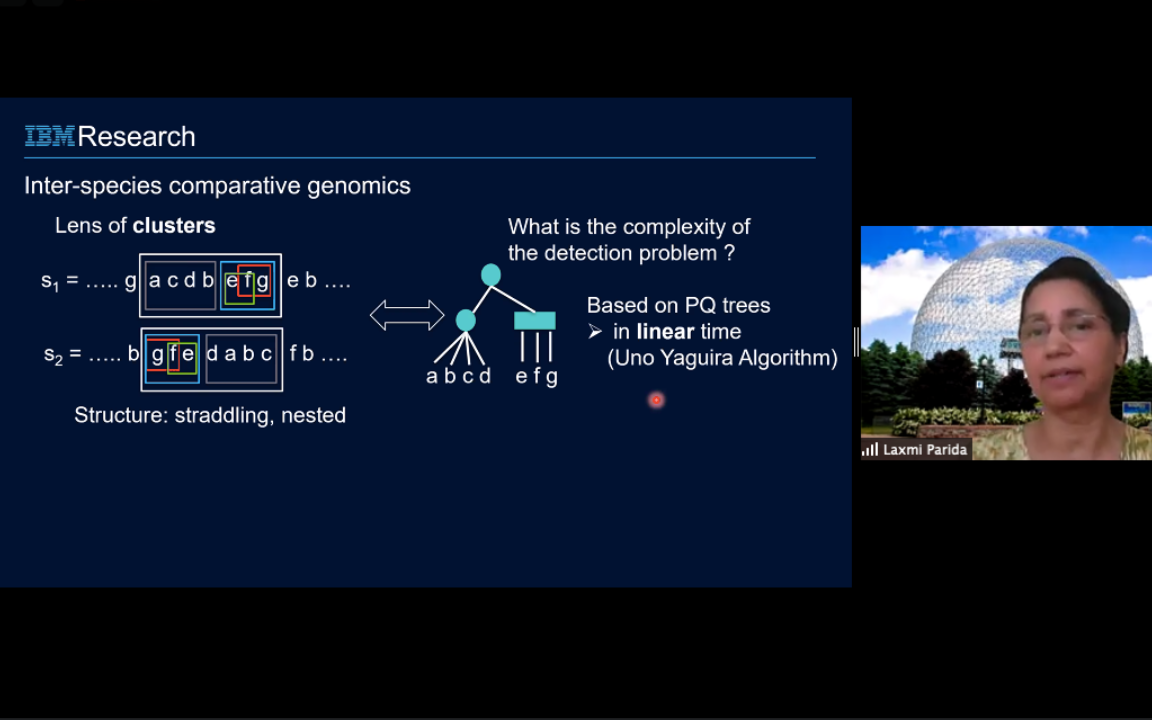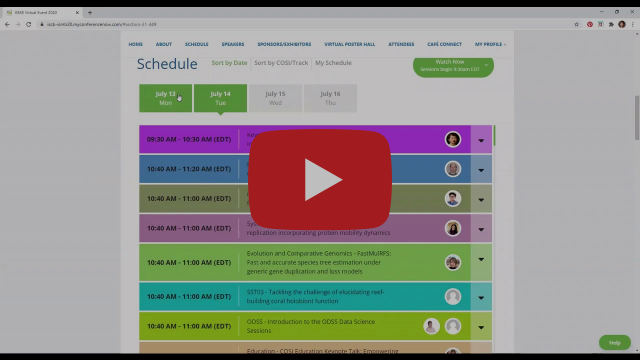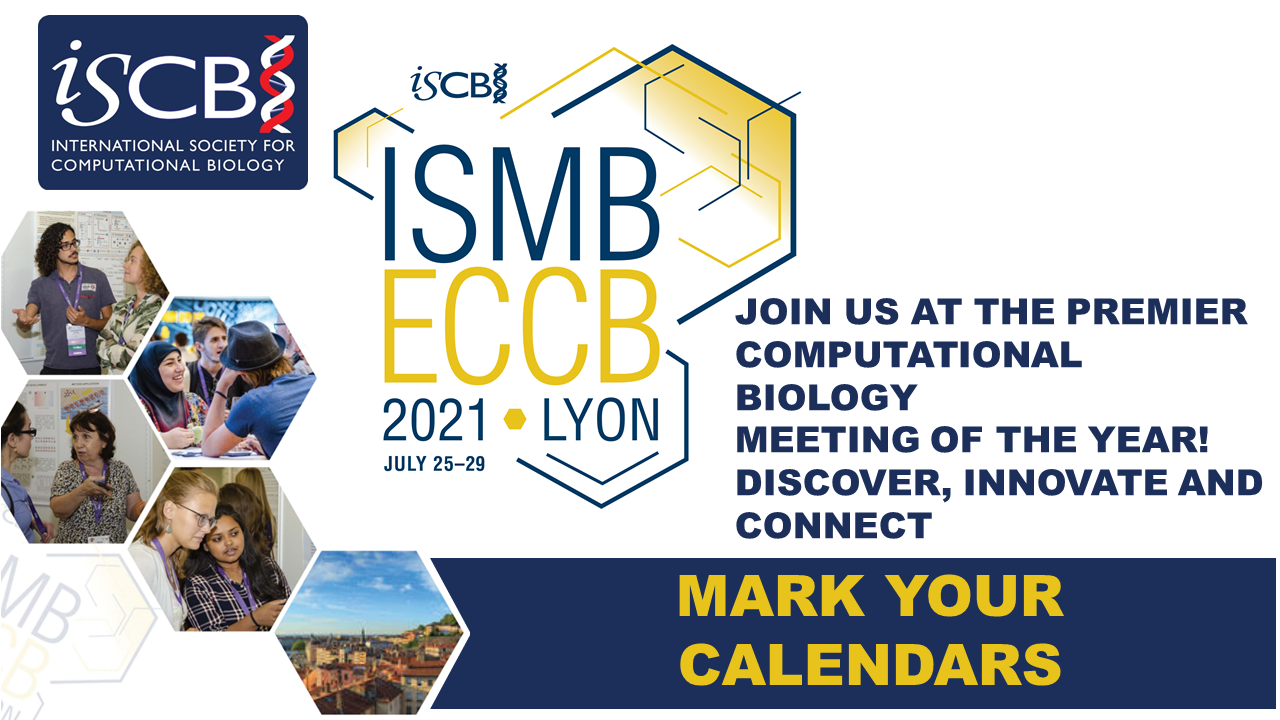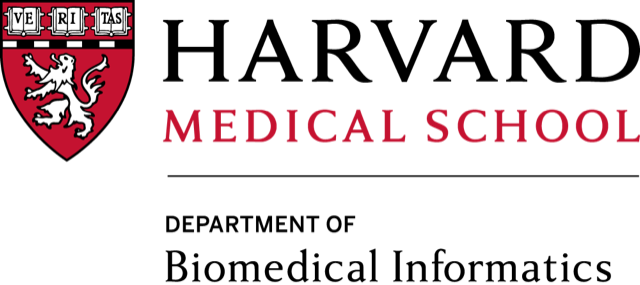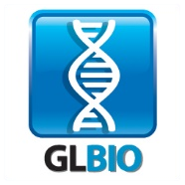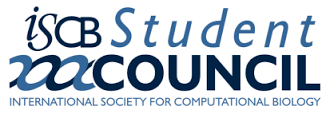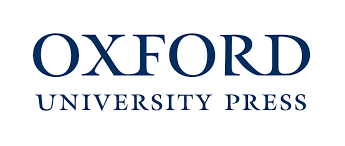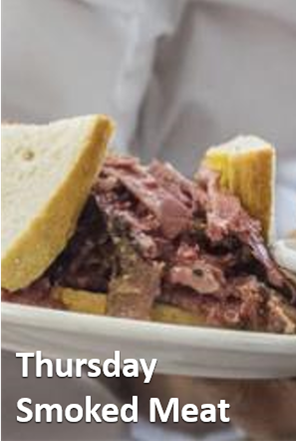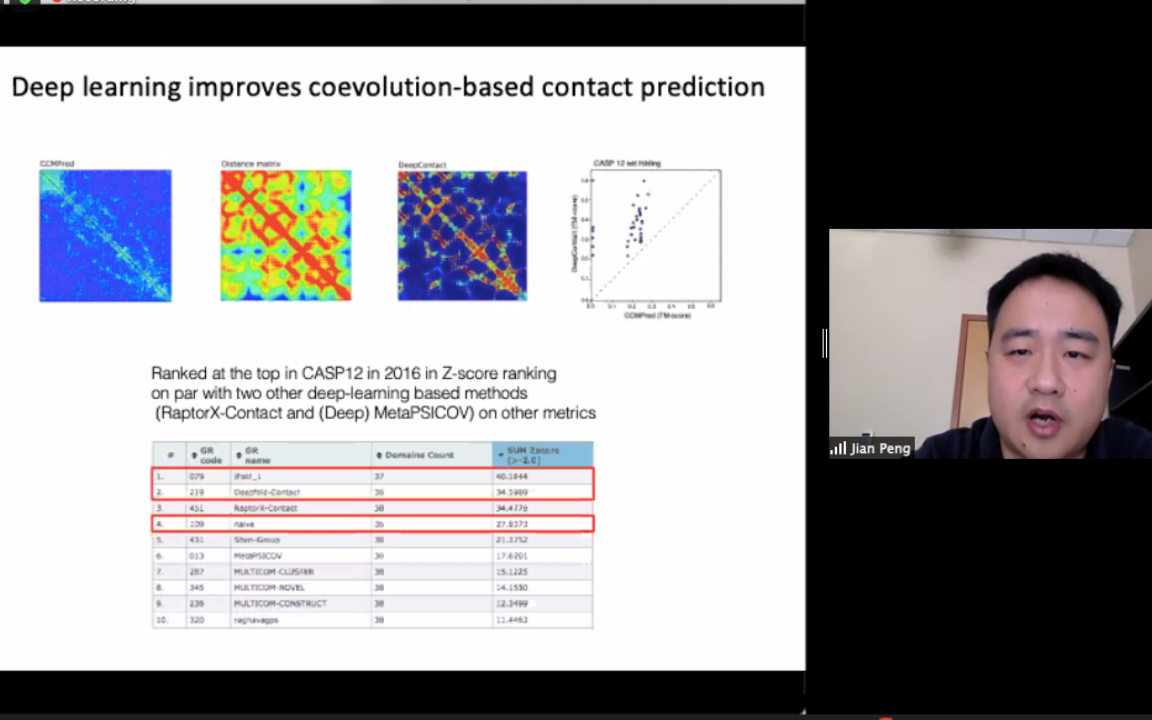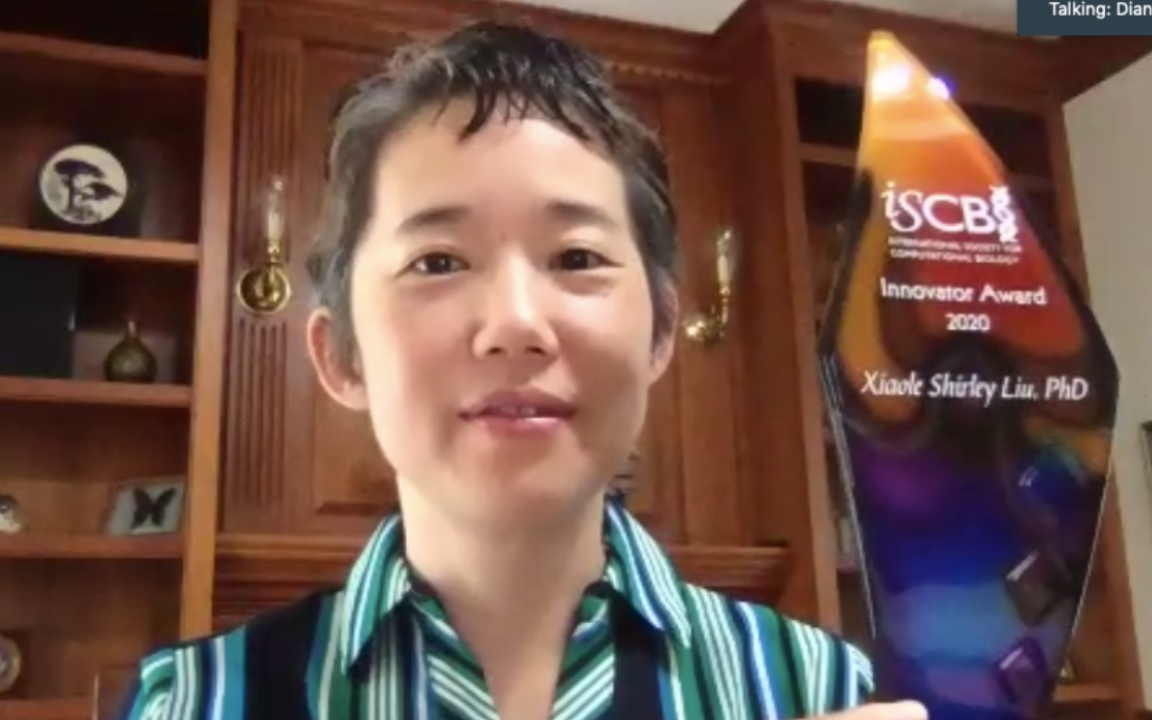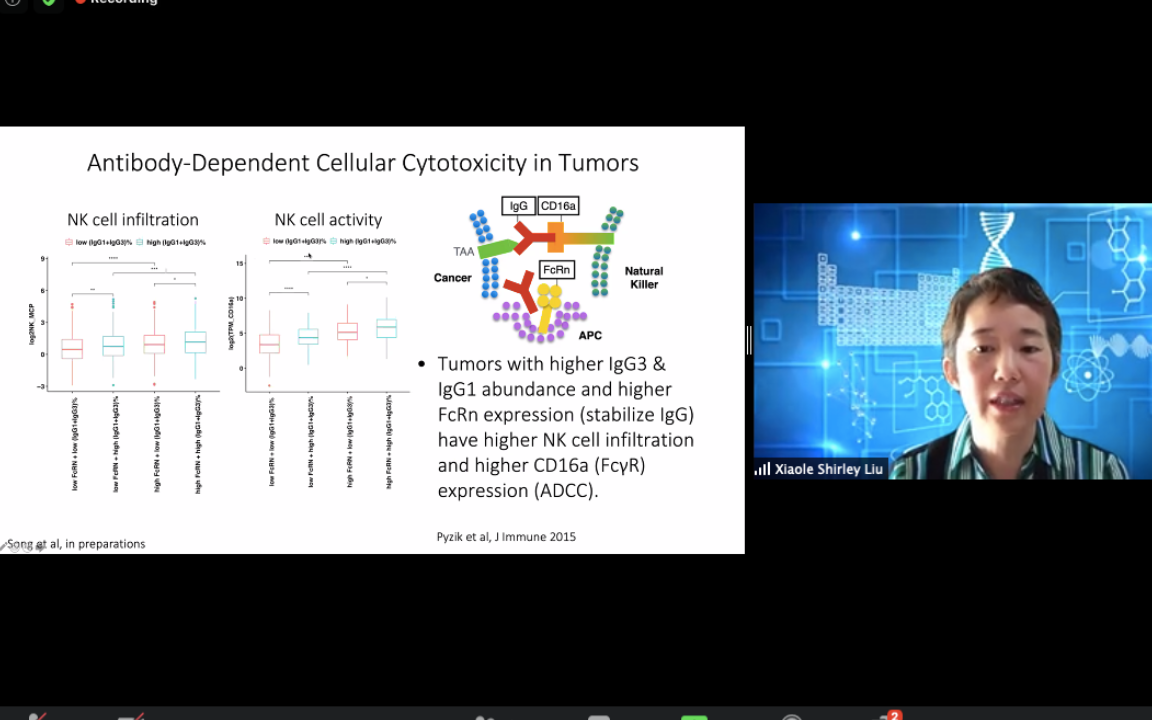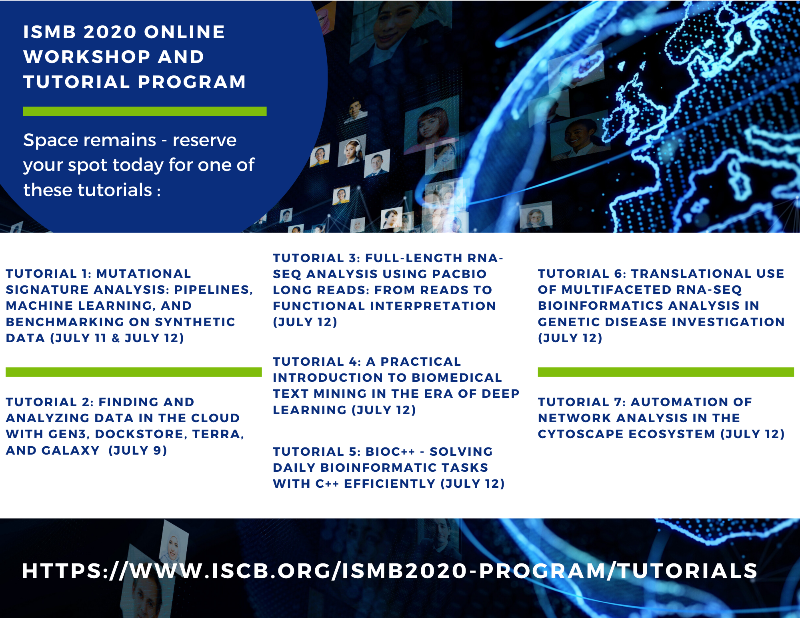Final Hours to Cast Your Ballot!
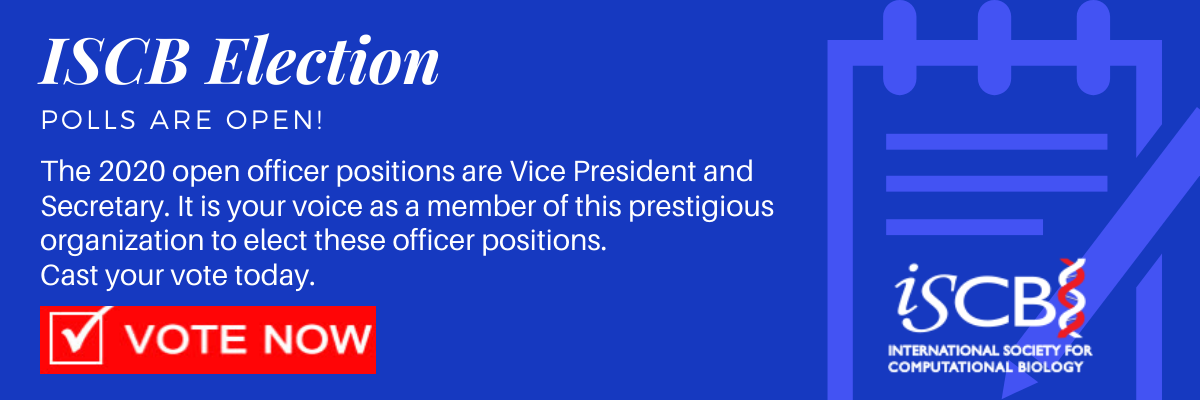
- - - - - - - - - - - - - - - - - - - - - - - - - - - - - - - - - - - - - - - - - - - - - - - - - - - - - - - - - - - - - - - - - -
Day 4: Highlights & Recap
Well that's a virtual wrap! The final day of ISMB 2020 has come to a close and what a great ending it was! Thank you to all who joined us in this virtual realm to make ISMB 2020 such a success!
The final day of the conference opened with the introduction of ISCB's 2020 Class of Fellows. Congratulations to:
| |
Serafim Batzoglou, DNAnexus
Judith Blake, The Jackson Laboratory
Mark Borodovsky, Georgia Institute of Technology
Rita Casadio, University of Bologna
Paul Flicek, EMBL-EBI
Osamu Gotoh, National Institute of Advanced Industrial Science and Technology
Rafael Irizarryo, Dana-Farber Cancer Institute / Harvard T.S. Chan School of
Public Health
Laxmi Parida, IBM
Katherine Pollard, Gladstone Institutes
Ben Raphael, Princeton University
Zhiping Weng, University of Massachusetts Medical School
Xuegong Zhang, Tsinghua University |
The morning's science began with the Conference Honorary Chair, David Sankoff introducing ISMB Distinguished Keynote Laxmi Parida, IBM, who gave an engaging presentation on Combinatorics, Statistics and Topology enabling Genomics resulting in a lively Q&A period.
The day continued with attendees hopping their way through the many fascinating and relevant special sessions, tracks and channel options.
Introduced by Ron Shamir, the ISCB Awards Committee Chair was the final Keynote of the conference, ISCB Accomplishments by a Senior Scientist Award Keynote, Steven L. Salzberg, Johns Hopkins University. His energetic and fascinating talk focused on Bioinformatics and genomics: a virtuous cycle driven by technology and ended after a dynamic and engaging Q&A period.
 |
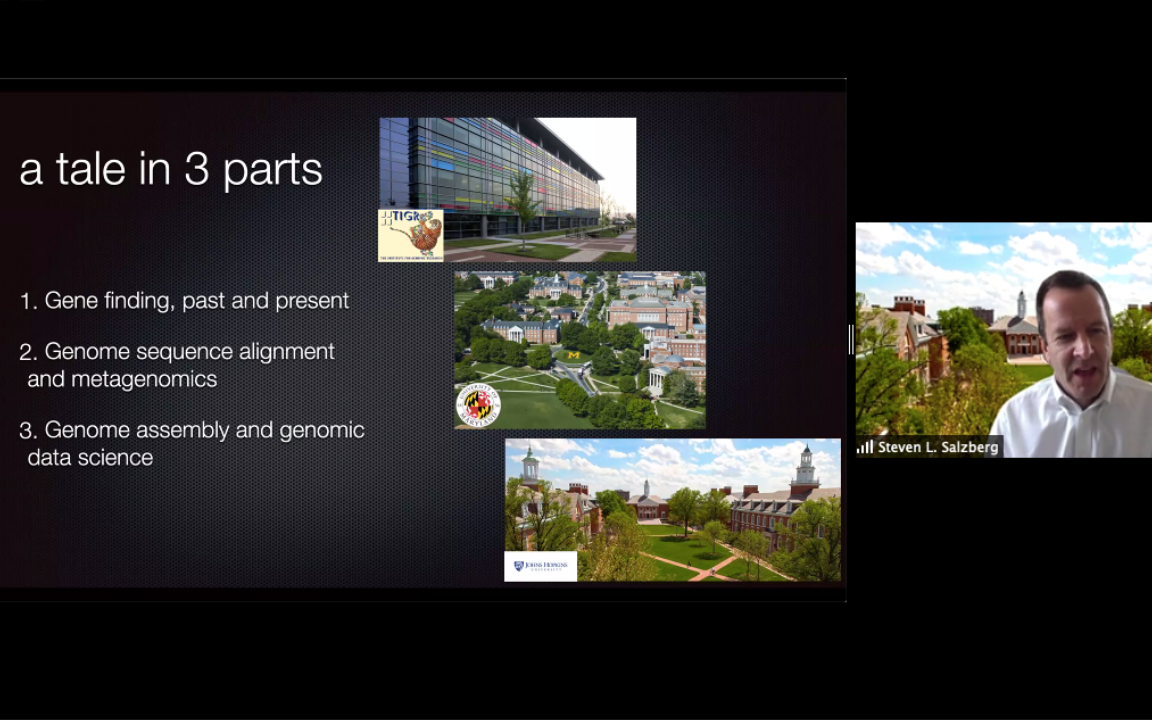 |
The final day of ISMB 2020 was brought to a close with the Conference Awards Presentations. Congratulations to all the award winners!
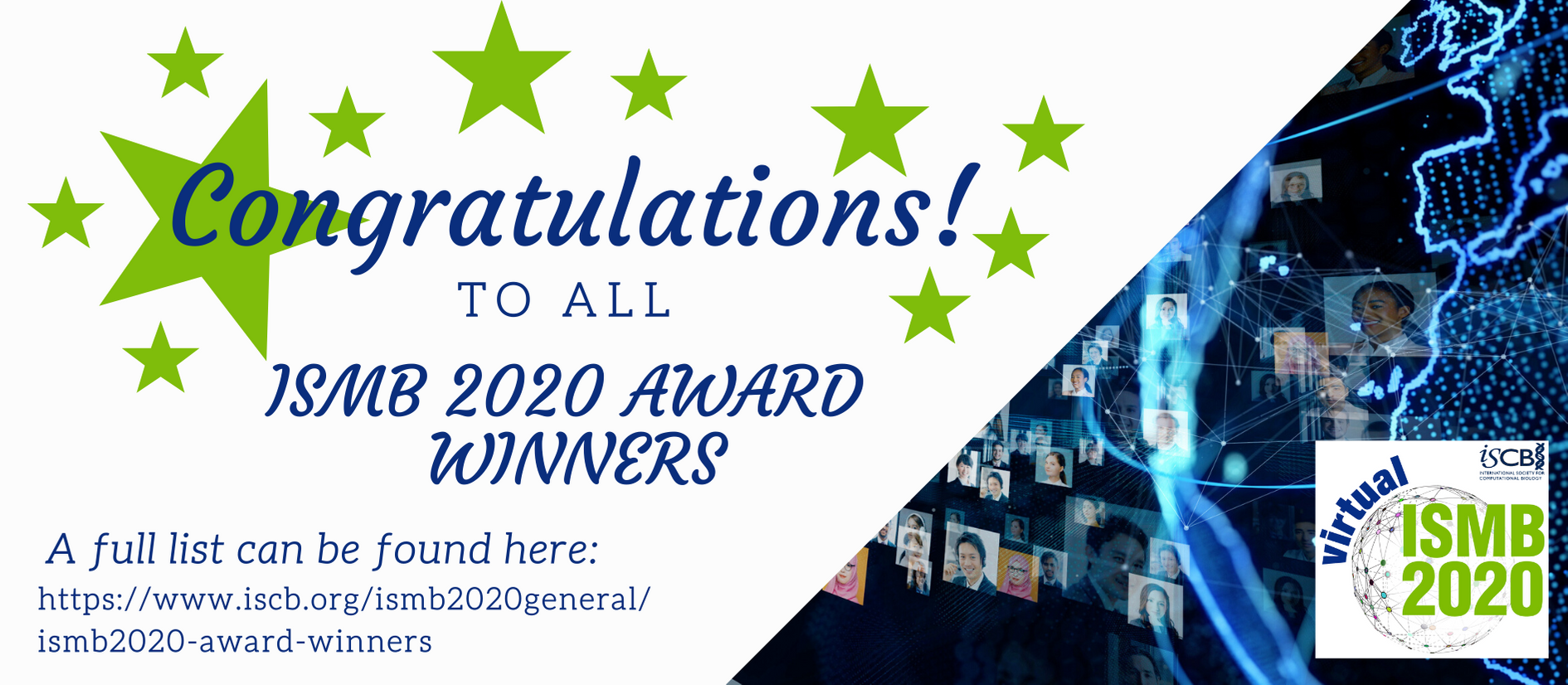
COSI Session recaps
Check out the many highlights from some of the COSI Track sessions that occurred during ISMB 2020:
TransMed COSI
TransMed COSI of this year started with a very insightful keynote talk by Jason H. Moore discussing the 20 Challenges of AI in Medicine. Dr. Moore reviewed and summarised the challenges in (medical) data and machine learning methods and recommended the areas and directions of how these challenges could be tackled in the future. He emphasised that the purpose of discussion these challenges is to raise the awareness and to encourage more research in the area.
The proceedings talks as well as the talks selected from the abstracts covered different methodologies, especially machine learning and their applications in different translational medicine areas including different types of diseases (cancer, Covid-19), seasonal biological patterns, drug response, singling networks, genotype-phenotype associations, pathways and health and lifespan in humans.
Our COSI session closed with another great keynote talk by Atul Butte on "Precisely Practicing Medicine from 700 Trillion Points of Data". Prof Butte highlighted the many freely available data resources currently existing that are still not being exploited to their full potential, including chemical information, clinical trial results and electronic health records. He advocated for the development of methods to effectively mine such datasets to extract clinically meaningful information, and discussed multiple success stories where his initial exploration of the data was converted into multi-million dollar start-ups. The impressive electronic health record database built by his group at UCSF is demonstrating the potential of such resources in predicting disease onset, evolution and outcome. Prof Butte emphasised the importance of maximising the use of data and technologies beyond scientific publications, and the fact that entrepreneurial initiatives are crucial to drive research endeavours towards societal impact.
Though it was a virtual event, we had wonderful session with existing talks and nice discussion!
SysMod COSI
SysMod discussed various modeling techniques, including flux balance analysis, machine learning, and logical modeling, and their application to a multitude of biological systems. The three keynote talks focused on modeling cytokine responses, translation of observations from mouse to humans, and modeling approaches for drug discovery. Ph.D. students and postdocs gave several exciting discussions thriving to integrate more omics data to improve mechanistic understanding.
EvolCompGen COSI
The Evolution and Comparative Genomics (EvolCompGen) COSI track at ISMB2020 featured a stimulating mix of proceedings and contributed talks on wide variety of topics, befitting the central role of evolution in the biological sciences. The talks touched on timescales as short as those for viral epidemics and the progression of cancer to those as long as the complete history of life on Earth Computational topics included species tree estimation, phylogenetic tree comparison, modeling protein sequence evolution, and reconstructing genome rearrangements. If you would like to stay in touch with the EvolCompGen COSI, make sure to update your ISCB member profile by adding this COSI to your Interest Areas, and follow the COSI on twitter @EvolComp.
iRNA COSI
The iRNA COSI had a successful and lively meeting, with four invited keynotes, a live and animated panel discussion on long read RNA-seq, 18 talks from abstracts and 5 proceedings talks. Despite the difficulty in organizing such an event virtually, the iRNA COSI carried out a successful interactive poster session with presenters in breakout rooms and participants visiting rooms, leading to stimulating discussions with up to 6-7 people. The iRNA COSI covered wide topics of interest for RNA computational biologists such as transcriptomics (including a keynote presentation by Ana Conesa), noncoding RNA biology, RNA metabolism (with a keynote from Athma Pai), RNA alignments and structure prediction (with a keynote presentation from Jérôme Waldispühl) and RNA subcellular localization (with a keynote from Éric Lécuyer).
CAMDA COSI
Virtual CAMDA 2020 took off to a full house, with the almost 200 delegates likely grateful that they didn't have to cram into a real room, while reducing their carbon footprint by 100 tons of carbon dioxide. Opening the session, former NSF director Prof. Rita Colwell show-cased in her keynote on cholera the power of multi-level analyses ranging from microbial meta-genomics via public health to climate-scale effects, which was followed by a variety of contributions by CAMDA delegates dissecting the interactions of urban microbial meta-genomics and ecological climate niches. Daena Farber's Aedin Culhane started the second day of CAMDA with a much-anticipated keynote on cancer single-cell -omics data-integration and factor analyses, giving a practical tour de force of current algorithmic alternatives, which was followed by contributions of CAMDA delegates on challenging cancer data sets and drug safety predictions. While the traditional real-world CAMDA dinner was sorely missed this time, as every year, the last session closed with a ceremony where promising young scientists accepted the treasured CAMDA Awards, which was nicely put into context by Joaquin Dopazo marking the CAMDA 2000-2020 anniversary with a perspective of how the 'Critical Assessment of Massive Data Analysis' pioneered the crowd-sourcing of science, showing the way with open ended questions in scientific data analysis competitions, which naturally segued into Wenzhong Xiao leading a discussion of current challenges in Big Data analyses for CAMDA 2021 and beyond - join us and help shape the next competitions at www.camda.info!
Education COSI
The Workshop on Education in Bioinformatics (WEB) led off our education program Monday afternoon with a series of talks followed by group discussion and activities centered on the timely topic of moving education and training online. The Education COSI track on Tuesday then presented a broader full-day program on education in computational biology and bioinformatics with a selection of invited and contributed talks. The program included keynote talks by Bérénice Batut on building an infrastructure for comprehensive and current bioinformatics training and by Rafael Irizarry on online data science education, as well as a series of short talks on a educational experiences and strategies covering a diverse array of training environments, cohorts, and objectives.
MICROBIOME COSI
The well-attended MICROBIOME COSI track featured inspiring keynotes by Niranjan Nagarajan and Amy Willis, highlighting the value of long-read sequencing for strain-level genome recovery and approaches to reduce biases in microbial abundance estimates. Talks about the second round of benchmarking challenges organized by CAMI, the Initiative for the Critical Assessment of Metagenome Interpretation, highlighted current challenges for the field.
Bioinfo-core COSI
The bioinfo-core COSI held a virtual session exploring both present and perennial topics, including spatial transcriptomics, single cell analysis, bioinformatic capacity building, and mentoring and management of bioinformatics cores. In small breakout groups, participants were able to meet colleagues from diverse cores, functions and backgrounds and discuss these topics in greater depth. The discussions were presented to the room and we look forward to our upcoming café connect zoom meetup for further sharing and brainstorming. Please see our wiki for more details, slides and notes. (http://bioinfo-core.org/)
JPI COSI
The Junior PI COSI had two enjoyable meetups via Café Connect with our fellow new investigators. JPI discussions continue during the year as a channel within the @NewPISlack – a peer support network with over 2,000 other new principal investigators. We encourage all junior faculty and group leaders in the ISCB community to connect (https://newpislack.wordpress.com).
RegSys COSI
The two days of RegSys attracted a large number of participants, with an average of 130 attendees at any given time attending each of our six sessions. We enjoyed exciting keynote talks from Wyeth Wasserman, Sara Mostafavi, Dana Pe’er, Francesca Luca, Christina Leslie, and Quaid Morris, three proceedings papers, and eleven contributed talks. Our sessions in Day 1 focused on advances in the application of interpretable deep learning approaches to problems in regulatory genomics, new methods for understanding 3D chromatin organization, innovative approaches for comparing regulatory programs across species, and advances in inferring regulatory relationships from single cell data types. Keynotes and contributed talks demonstrated cutting-edge developments in the use of neural networks for interpreting and predicting transcription factor DNA-binding sites in high resolution across cell types and species. The keynotes in particular gave wonderful overviews of progress in regulatory genomics over the past decade, while simultaneously spurring thought and discussion about future directions in the field. Day 2 focused on linking regulatory genetic variants to human diseases and phenotypes, with several talks characterizing regulatory genomic signals that explain cancer phenotypes. Presentations illustrated the power of characterizing regulatory variants in large populations of individuals or single cells, demonstrating that new technologies are enabling the detection of regulatory variants that explain complex traits. Our keynote speakers gave inspiring talks showing how to leverage large collections of regulatory genomics data to generate better understanding of the regulatory programs driven by DNA- and RNA-binding proteins. We had a very enjoyable virtual program overall, with well-attended Café Connect sessions spurring stimulating discussions.
Text Mining COSI
At the Text Mining COSI, keynote speaker Dr. Cathy Wu discussed her research into knowledge discovery through integrating literature mining, data mining and semantic computing. Keynote speaker Dr. Russ Altman explored advancing understanding of drug actions through mining literature and social media to support drug respositioning and analyze adverse effects. A frequent theme for both session talks and posters was applying deep learning methods to biomedical literature and social media for text classification, entity recognition and relation extraction, with additional themes in best practices for preparing text datasets for text mining - or even a single article before publication. The COVID-19 panel included demonstrations and discussions of four systems automating aspects of evidence gathering, establishing mechanisms and exploring SARS-CoV-2 related literature and social media.
- - - - - - - - - - - - - - - - - - - - - - - - - - - - - - - - - - - - - - - - - - - - - - - - - - - - - - - - - - - - - - - - - - - -
Conference Attendee Resources - Post ISMB 2020:
Jobs Board
Still looking for that perfect candidate or position? All ISMB 2020 job postings will now be accessible via the ISCB Career Center plus so many more resources.
ISCB Membership
ENJOY ISMB? Why not enjoy all year long? Keep enjoying the science, networks made, career growth and become an ISCB member today!
Bioinformatics Bazaar
Don't forget to visit the Bioinformatics Bazaar, the conference attendee grab bag of crowd-sourced products, services, and tools. |


